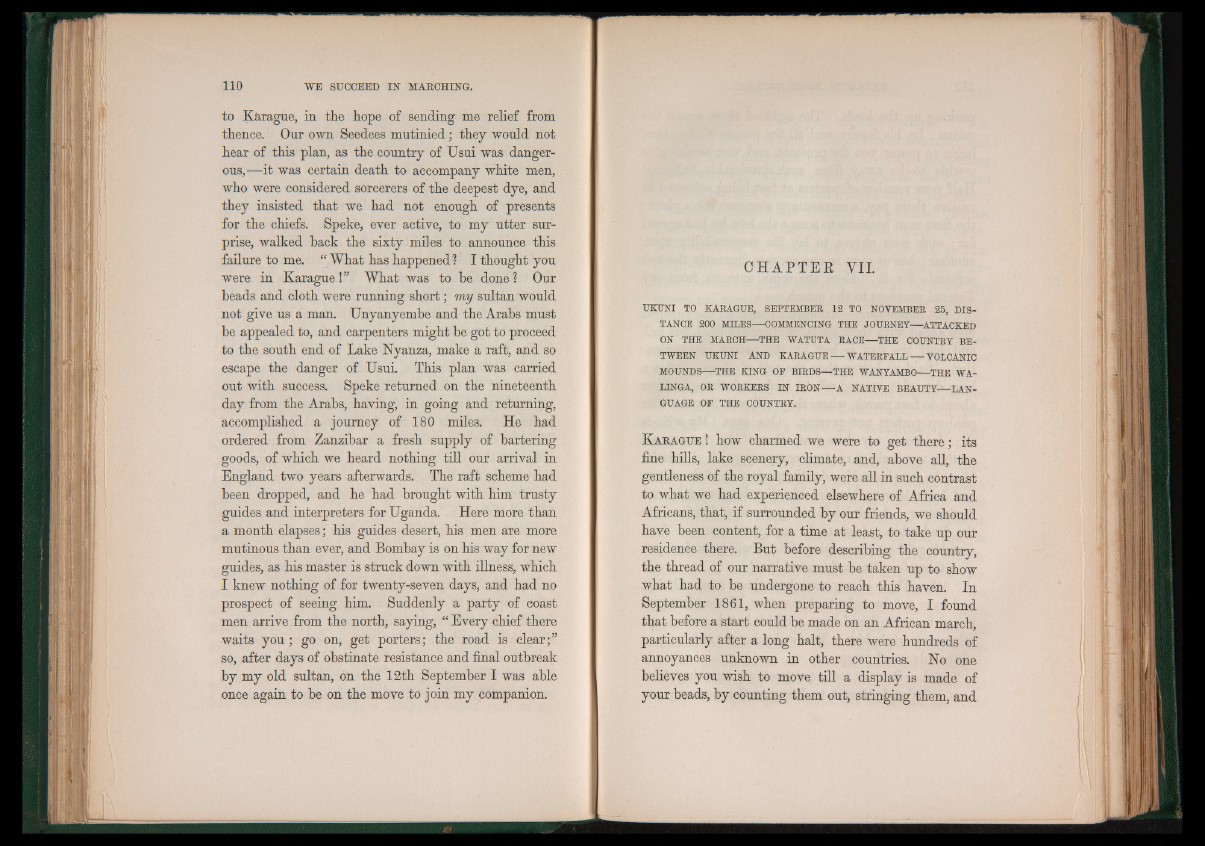
to Khrague, in the hope of sending me relief from
thence. Our own Seedees mutinied; they would not
hear of this plan, as the country of Usui was dangerous,—
it was certain death to accompany white men,
who were considered sorcerers of the deepest dye, and
they insisted that we had not enough of presents
for the chiefs. Speke, ever active, to my utter surprise,
walked hack the sixty miles to announce this
failure to me. “What has happened? I thought you
were in Karague!” What was to be done? Our
beads and cloth were running short; my sultan would
not give us a man. Unyanyembe and the Arabs must
be appealed to, and carpenters might be got to proceed
to the south end of Lake Nyanza, make a raft, and so
escape the danger of Usui. This plan was carried
out with success. Speke returned on the nineteenth
day from the Arabs, having, in going and returning,
accomplished a journey of 180 miles. He had
ordered from Zanzibar a fresh supply of bartering
goods, of which we heard nothing till our arrival in
England two years afterwards. The raft scheme had
been dropped, and he had brought with him trusty
guides and interpreters for Uganda. Here more than
a month elapses; his guides desert, his men are more
mutinous than ever, and Bombay is on his way for new
guides, as his master is struck down with illness, which
I knew nothing of for twenty-seven days, and had no
prospect of seeing him. Suddenly a party of coast
men arrive from the north, saying, “ Every chief there
waits you; go on, get porters; the road is clear;”
so, after days of obstinate resistance and final outbreak
by my old sultan, on the 12th September I was able
once again to be on the move to join my companion.
C H A P T E R VII.
UKUNI TO KARAGUE, SEPTEMBER 12 TO NOVEMBER 25, DISTANCE
200 MILES— COMMENCING THE JOURNEY— ATTACKED
ON THE MARCH— THE WATUTA RACE— THE COUNTRY BETWEEN
UKUNI AND KARAGUE — WATERFALL — VOLCANIC
MOUNDS— THE KING OE BIRDS— THE WANYAMBO— THE WA-
LINGA, OR WORKERS IN IRON— A NATIVE BEAUTY— LANGUAGE
OE THE COUNTRY.
K arague ! how charmed we were to get there; its
fine hills, lake scenery, climate, and, above all, the
gentleness of the royal family, were all in such contrast
to what we had experienced elsewhere of Africa and
Africans, that, if surrounded by our friends, we should
have been content, for a time at least, to take up our
residence there. But before describing the country,
the thread of our narrative must be taken up to show
what had to be undergone to reach this haven. In
September 1861, when preparing to move, I found
that before a start could be made on an African march,
particularly after a long halt, there were hundreds of
annoyances unknown in other countries. N o one
believes you wish to move till a display is made of
your beads, by counting them out, stringing them, and